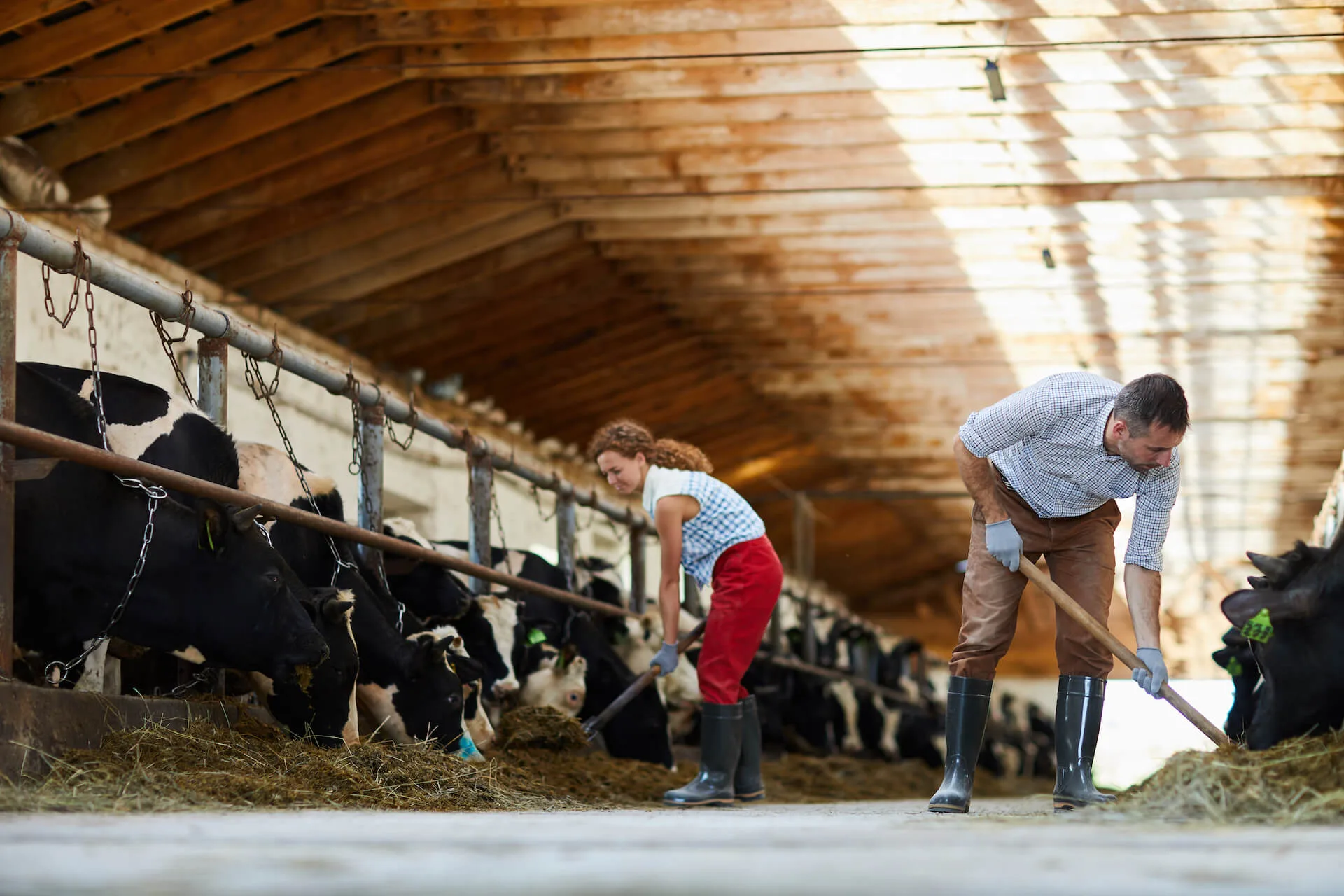
Generations-old Michigan family farms have shut down because of big conglomerates. Michigan consumers are suffering at checkout lines as a result.
Need to Know
- Farmers receive only 14 cents for every dollar that consumers spend on food.
- Michigan family farmers have been left with only a few low-return options to sell their food, and now, many have gone under.
- New legislation would let Michiganders know where their food is coming from and could break up monopolies.
ITHACA, Mich.—Dennis Kellogg has lived on his mid-Michigan farm since birth. Over that time, he’s has seen changes aplenty. The climate has changed, and the seasons have shifted—making harvest and planting more unpredictable.
His life has changed, too. Kellogg went from the son who inherited the land from his parents to the father who’s passing it down to his son.
The one constant is that he’s still here, on the farm. Kellogg doesn’t plan on that changing either, despite the fact that he’s seeing less of his products’ profits and paying more to get them to market.
“Hope we can keep it going on for a long time yet,” he said.
Over time, though, he’s seen neighbors surrender to the hostile conditions surrounding family farms, as they age and cash out on their property and equipment—which often amounts to their retirement.
Between 2012 and the end of the last decade, more than 5,000 Michigan farms shut down.
Kellogg himself has been forced to make major changes. At one point he had 150 head of cattle. Now, he’s down to 30, under the influence of his son, and the farm is more of a menagerie of cash crops and animals.
Every season brings a surprise, so he has to be agile. Sometimes, he plants corn; sometimes, it’s wheat.
RELATED: Six Generations and Counting: A Story of Michigan’s Dairy Farms
What’s forced Michigan farmers to adapt isn’t just the climate itself; it’s the business climate too. Four major companies—Cargill, Tyson Foods, JBS, and National Beef Packing—control the food supply of cattle and other agricultural products in a stranglehold, and farmers have had to pay more to get their animals slaughtered, packed, and sent to market as a result.
When farmers’ products are bought, it’s these companies that see the big pay day.
As local businesses have exited, start-up costs have grown greater, preventing new entries into the field. Many people with farms have taken a second job in the nearby town to get health insurance, retirement benefits, and the like.
Input costs are particularly higher now, during the pandemic, driving further concern among many. Those companies, meanwhile, have made record profits.
“You have high prices in the showcases and the stores, and the farmer don’t really get much of that,” Kellogg, whose son now runs the business with him, said. “Seems like the retailer and everybody in between seems to be doing quite well, but the one who actually creates it so it’s able to be there, somehow they forget about them.”
Shifting the Supply
Michigan farmers have seen a long-term shift of their product—cattle, bean, wheat, everything—taken further away from themselves and the customer.
The result is that big corporations that process, pack, and distribute their goods are skimming more off the top. For a pound of sirloin steak that retails for $10.49, for example, the farmer only receives $1.98 of the share, according to the National Farmers Union.
This isn’t a this-year, last-year, or year-before problem, Bob Thompson, President of the Michigan Farmers Union, said. This trend has happened over decades of consolidation, with the “Big Four” owning much 85% of the country’s beef market and effectively dictating the prices and process for everyone else.
“When I take an animal to market, it’s take it or leave it,” Thompson, who grew up on a fourth-generation dairy farm and still maintains it as a farm of all trades, said.
Kellogg has seen the number of local slaughterhouses shrivel, which is a major problem—farmers want to sell their beef in stores, they need USDA-approved slaughterhouses to go through. Same for processing plants and packers.
When there’s only one or two that are open to family farmers in the area, they’re forced to accept higher prices, travel long distances, and spend more time getting their product to market.
Meanwhile, the big players in the game are vertically integrated, meaning they own all their own production, packing, and distribution facilities. They’re able to save greatly on costs while extorting the farmers who have nowhere else to go.
“The income inequities in the rural communities, particularly in your farm communities, there’s a wide gap,” Thompson, who spent his career at USDA, said.
Fairness for Farmers
Michigan farmers say that the Biden administration has brought these issues back into the national spotlight. President Biden has ordered agencies to look at how these four companies have negatively impacted farmers, by raising prices while shortchanging farmers, and encouraged the US Department of Agriculture to review its interpretation of labeling laws.
An executive order last summer, titled “Promoting Competitiveness in the American Economy,” called on agencies to enforce and investigate antitrust laws—which prevent monopolies that render business uncompetitive—in many markets, including agriculture. Michigan Democratic Senator Debbie Stabenow came out in support of the initiative, saying “we have work to do.”
Recently, the US House Antitrust Subcommittee within the Judiciary Committee held a hearing on how the monopolization of the market has pushed farmers and consumers further apart.
But that’s not the only issue.
ALSO: 11 Small Michigan Businesses That Are Community Anchors
Fairness for Consumers
In stores, consumers are getting duped.
Many times, what they’re purchasing is not local, Thompson said. In 2008, public outcry persuaded Congress to adopt the Country-of-Origin Labeling law, requiring certain food products—including fruits, vegetables, and cuts of meat—to clearly state country of origin.
But if a cow is raised and slaughtered in a foreign country but packed and processed in the US, it’s labeled as a product of the United States of America. Enforcement on these issues has left farmers wanting.
Michigan farmers have been working with members of the state legislature on a program that would let consumers know when a Michigan family farm raised their beef, Kellogg said. A sticker on the package would say “Michigan Born, Michigan Bred, Michigan Processed.”
The buy-local message isn’t a feel-good marketing campaign, either. It’s meant to inform customers how they’re being taken advantage of by a flawed system too.
Last summer, when farms dumped excess milk and had products spoil because processing plants didn’t move food to the market, consumers saw prices for beef, milk, eggs, and other goods jacked up.
That wouldn’t happen if farmers and consumers were brought closer together, Thompson said. Consumers would receive better prices, and farmers would have less costs to pay out and more profit to bring in.
“The ultimate goal here is to get the food supply as close to the consumer as we can, cut out as much of the middle people as we can,” Thompson said.
For the first time in years, however, farmers are feeling optimistic, Thompson said. They have an administration that’s lent a sympathetic ear and proposed actual solutions, like reevaluating labeling and trust-busting.
Kellogg remembers Biden bringing up that the US needs more regional slaughterhouses, so that farmers aren’t forced to accept the high prices offered by the handful of companies that control the process. He couldn’t agree more.
For Michigan farmers, these issues aren’t just about a few pennies here and there, either. Those that are remaining want to stay in business.
Kellogg is the sixth generation on his farm. As his son, the seventh generation, takes over more responsibility, he hopes to pull his plane out of the shed and fly the dust off of it. The farm and the wood-heated buildings are the way of life he knows and loves, and he’s not ready to give it up yet.
On December 22, he had a surgery to cut out a cancerous tumor—fortunately, evading chemotherapy. Still, he’s on the mend, and many of the chores around the farm and house are being carried out by his son and wife.
But that won’t stop him from pitching in to help the business.
“I got to get myself programmed so I can go out to the farmers’ union convention next month,” he said. “I think I’ll be okay for that.”
SUPPORT: Michigan Farm Tour: Cider Mills, Hayrides, and Pumpkin Patches

VIDEO: Trump isn’t the only republican facing charges for alleged financial crimes
https://www.tiktok.com/@gandernewsroom/video/7361494909938978090 A whole lot of Michigan Republicans and lobbyists are facing criminal charges for...

VIDEO: It’s expensive to be poor in Michigan
https://www.tiktok.com/@gandernewsroom/video/7361154790300060974 Ever heard of predatory payday loans? Here’s how new laws could help protect...

Here’s everything you need to know about this month’s Mercury retrograde
Does everything in your life feel a little more chaotic than usual? Or do you feel like misunderstandings are cropping up more frequently than they...

The ’Gander wins multiple 2023 Michigan Press Association awards
MICHIGAN—The ’Gander Newsroom has earned multiple awards in the 2023 Michigan Press Association Better Newspaper Contest. The awards were announced...

Michigan Republicans ask Supreme Court to restrict medication abortion access
A lawsuit supported by Republicans could disrupt access to the most common form of abortion—even in Michigan, where reproductive rights are...




